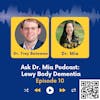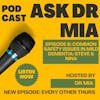Lecanemab Update: Predicting the near future of Alzheimer's drugs

For the last episode of season 2, Dr. Mia talks about lecanemab, a monoclonal antibody against amyloid, results since the show's most popular episode on lecanemab released on 10/7/2022.
Lecanemab or Clarity AD clinical trial results in New England Journal of Medicine (NEJM)
Death related to lecanemab, reported in Science, related to Cerebral Amyloid Angiopathy
Donanemab press release by Lilly
Key points:
1) Aducanumab approval process eroded public's trust and careful screening for patients for real-world implementation of lecanemab is needed to build back trust.
2) Actual number of patients eligible for lecanemab will be much smaller than the total number of persons living with Alzheimer's disease in the country: studies estimate anywhere from 1% to 12% of patients seen in real world clinics.
3) Our healthcare infrastructure is not ready for early, timely, and accurate detection of Alzheimer's disease and tracking patients on monoclonal antibodies.
Music & disclaimer
Transcripts on www.miayangmd.com. Transcripts are automatically generated and may contain minor inaccuracies.
Email: ask@miayangmd.com
Opinions expressed are exclusive of Dr. Mia Yang and not reflective of her or guest speaker's employers or funders.
Welcome to Ask Dr. Mia Podcast. This is episode number 26 and the last episode for season two. I started this podcasting journey about a year ago and have already finished two seasons. Thank you all for those who are listening and giving me support, whether it is through a comment, an email, or an Apple review. Thank you all very much.
I wanted to end this season two with an update on one of my most popular episodes that was released in the fall of 2022 right after Lecanemab, one of the new monoclonal antibody infusion drugs, came out with a press release showing that it had statistically significant improvement in a measure called the Clinical Dementia Rating Scale. And since that time, a lot has happened. So I wanna give you all an update since this is a very exciting time in Alzheimer's and related dementia research. For those who did not listen to the episode on Lecanemab, very briefly, I wanted to share that the Lecanemab full study results have since been published in a New England Journal of Medicine. And I will link the study link to New England Journal of Medicine in the show notes.
But a quick reminder about clinical dementia rating scale or a CDR, sum of boxes and the sum of boxes has to do with the way that this particular screening tool measures subjective complaints from the person with memory loss and a study partner. across multiple domains in terms of memory, orientation, judgment and problem solving, community affairs, and home and hobbies, as well as personal care. Sum of boxes means that all of these combinations of impairments across all of these domains are added up together. I'm not going to go into the full details of how CDR is being administered, But just to say that a sum of boxes of 0.5 could be consistent, slight forgetfulness with partial recollection of events, and "benign" forgetfulness, which may be related to age, versus a 1 on the memory domain would mean moderate memory loss or more marked for recent events and that the memory deficits does interfere with everyday activities.
In all of the monoclonal antibodies trials, including the Lecanemab trial, which is called CLARITY-AD, all of the participants who have been enrolled have very mild symptoms of memory loss. They either have what is called mild cognitive impairment or they have mild dementia. And the difference between the two is really in terms of how much memory loss there is for someone to be able to function independently. And some of the more complicated, independent activities include driving, managing our finances, or if you're someone who have many medications, managing your medications. So with the New England Journal of Medicine publication, we have also been able to get to see more details on the study results since the news release was first published. And in both groups, the arm that was randomized to the lecanemab infusion had slightly less decline over the 18-month study compared to the placebo group. which presumably received IV saline infusions that do not impact the amyloid.
The difference between the two groups on the CDR sum of boxes was a decline of 1.21 versus a decline of 1.66. And this is a scale that goes from zero to 18, but basically no one in the clinical trial ended up having a score of 18. They really varied between 0 to 3.5 or 4. They also released some secondary outcomes. And one of the key biomarkers that is looked at is the amyloid burden on an amyloid PET scan. And Lecanemab significantly reduced amyloid burden. compared to placebo, which is not surprising, as it is a monoclonal antibody against the amyloid plaques. There are also other outcomes related to function. And the specifics are not important, except to say that all of the secondary outcomes also match the primary outcome. where the group of participants that randomly were assigned lecanemab had less decline or better function compared to the arm that received the placebo. And when it comes to any sort of drug treatment, we're always balancing between the burden of the disease, the burden of getting the treatment versus the possible side effects. And ARIA, or amyloid-related imaging abnormalities, is a common side effect that is in all of the monoclonal antibody trials. So it is not just for lecanemab. There are two different types of arias and there is ARIA-E for edema as well as ARIA-H for hemorrhage. And these could be very subtle changes that are only seen on a brain MRI compared to when they first before any participant received a study drug. And most of the time these arias are resolving by themselves. But all of the study participants had very regular MRI imaging every few months, especially in the beginning of the study when they were first started on the lecanemab. The hemorrhage are parts that are very, very small. Microhemorrhages are very tiny points of hemorrhage that may not be picked up on a brain CT. So it's absolutely important that someone is able to tolerate an MRI and does not have pacemaker or other metal objects in their body that makes them not eligible to get an MRI to be able to safely receive lecanemab and have the ability to monitor for side effects.
In the lecanemab group, the most common side effect related to the drug was infusion-related reactions. And these could be swelling or redness at the site of the infusion. This happened in 26.4% of the lecanemab group versus 7.4% in the placebo group. Arias happened in 12.6% in the lecanemab group versus 1.7% in the placebo group. Most of the arias were quote unquote asymptomatic, meaning that the participant had no signs of any symptoms and they were only detected on the brain MRI. However, a little less than 3% of the lecanemab group had symptomatic aria edema, which could present as headaches, visual disturbance or confusion and aria H or for hemorrhage, which could present as dizziness. Most of the side effects or arias occurred between the first three months of the initial receiving of lecanemab.
So there obviously is a lot of controversy around the FDA accelerated approval for aducanumab, which is another monoclonal antibody that was approved in 2021. However, Eisai has also been granted accelerated approval, but it was not based on this particular New England Journal of Medicine result. It was based on its earlier phase two study result. Eisai has filed for traditional approval and the results should be released very soon, within the next month. CMS has followed the FDA after the aducanumab was given accelerated approval to say that the drug will only be covered under a registry of some sort. or clinical trial that are approved by CMS. And as far as I know, no such clinical trial has been set up. I think part of that is because both Eisai and Biogen that developed aducanumab are trying to go for the traditional approval, which would potentially have broader coverage options rather than doing another study under CMS approval. CMS also basically gave a national coverage decision that applied to the entire class of monoclonal antibodies that said that they will not cover for any accelerated approval drugs without additional randomized controlled trials. And all of that is likely to change if Lecanemab is going to receive the full approval.
A number of organizations on both sides have been arguing for and against coverage, but I think from a purely scientific perspective, the data that is released by Eisai about lecanemab in the New England Journal of Medicine is of much higher rigor and definitely has consistent results, both statistically and one could argue clinically meaningful. for participants and for patients who are living with mild memory loss. I think from a scientific perspective, it would not come as a surprise to anyone who is in Alzheimer's field to have FDA grant the traditional full approval for Lecanemab just within the next couple of weeks. CMS has also released a statement that basically said that they will cover for monoclonal antibody, particularly for lecanemab because it's the most promising one so far, and that they will require a registry that will continue to track real-world patients' experiences both in terms of side effects and ARIAs as the drug gets paid for by CMS. Interestingly, the Veterans Affairs that covers health care for millions of veterans has added lecanemab as part of its formulary in March of this year. So I think that is a sign that the largest single payer system within the country is preparing to pay for lecanemab and potentially other monoclonal antibodies that are being developed.
Speaking of other monoclonal antibodies, there is another drug that has just been released to also show significantly slower decline in memory. And this one is developed by Lilly, the company that makes Donanemab. And these study results, these press release results were released earlier in May, and the full results will be available at the International Alzheimer's Association Conference in Amsterdam in July. So I think a lot of things will be rapidly in succession and we will know within a very short period of time whether Lecanemab has full FDA approval and almost most likely to also have CMS coverage. as well as whether or not Donanemab will likely also get full approval because the press release shows pretty similar, if not slightly more impressive results compared to Lecanemab. But the full study results for Donanemab will be released a little bit longer, in a couple months, hopefully in a peer-reviewed random, peer-reviewed journal.
So what is coming up next? Well, I think we have a lot of trust building to do because the Aducanumab approval process really eroded the public's trust and as well as my scientific community within geriatrics. I haven't really not met. many geriatricians who are very enthusiastic about any of the monoclonal antibodies. And although it might be beneficial to pharmaceutical companies to broaden the eligibility criteria for participants who were in the lecanemab trial. into a broader category of potential patients with Alzheimer's disease, I think it would be very foolish of them to try to do so because there will be side effects and potential devastating bleeds in this translation from the clinical trial population to the real world population unless these patients are carefully screened for and monitored over time. It is unclear at this time what CMS means in terms of registry and how that may be different or the same as some other private organizations such as the Alzheimer's associations registry. And it will be interesting and important for the government and other nonprofit organizations to work together for data management and consistency in the reporting of actual patients who are receiving these drugs. I think it will take years potentially to build back the trust that aducanumab approval process has eroded because I think not that many patients will be willingly interested in taking these drugs because of the news reports of participants who have died while being on these drugs and other controversies in the media.
So speaking of eligibility, what are monoclonal antibodies for amyloid? Who are these drugs appropriate for, particularly from the perspective of a primary care physician? So I would suggest to my primary care colleagues, and I am one, although I'm seeing patients who are usually much farther along the dementia journey than the ones who are in the earlier stage. I think this is really only appropriate for folks who are very early in their disease course. They must have some sort of amyloid positivity. The biomarkers could really range between CSF or an amyloid PET scan. The studies have used amyloid PET scan, but CSF is cheaper. And there are also some promising blood biomarkers that may be a good triaging process to easily detect elevated amyloid levels. It will be very interesting and necessary for CMS to also approve some sort of insurance coverage for amyloid biomarker testing, because right now amyloid PET scans are not covered by insurance, which makes it too cost prohibitive for most of my patients. And these participants or patients really should have very little vascular disease, meaning preferably without high blood pressure, diabetes, high cholesterol, because they need to have a baseline MRI that has very few, if not none, micro-hemorrhages. They have to be able to tolerate MRIs, as I've already stated, in order to track the safety of these drugs over time. The patients really should not be on anticoagulation, meaning medications like Warfarin, Coumadin, Lovenox, Eliquis, all of the anticoagulations or bleeding problems are not patients who will be good candidates for this medication.
And it is a little unclear right now how different medical centers and memory clinics will be delivering monoclonal antibodies. Certainly, it will most likely fall within neurology clinics because neurologists already deliver IV infusions for other treatments, including multiple sclerosis, but certainly not necessarily within the realm of geriatricians to actually deliver IV infusions because we don't have any clinics that have the capability of delivering IV infusions. So patients need to be able to tolerate every two weeks infusions, if it is Lecanemab, every month infusions, if it is Dananemab. I don't think anyone will be giving out Aducanumab based on the study results and its controversy. And of course, their memory loss will not be explained by other reasons such as medications and anti-cholinergic medicines, hearing impairment, significant psychiatric or medical illness, all of those things would make someone potentially not eligible or not appropriate for the monoclonal antibodies.
And since the Lecanemab results have come out, there have been some multiple studies actually looking at the clinical trial eligibility criteria versus their real-world data. And this is looking at nationally within several cohorts of data, as well as internationally within memory clinics in the people who come into the clinic. and looking at how many of those people would actually fit the clinical trial criteria for Lecanemab and Aducanumab. And the actual percentages are very, very few, anywhere from one person to teens, less than 20% perhaps of patients who have dementia or mild cognitive impairment will be actually eligible due to its long list of contraindications.
And there's also a lot of debate in the scientific world about what is clinically meaningful, because the disease changes over time. So does a little bit of slower decline in the earlier in the disease course mean compounding benefit over time? I don't think we know for sure. We can certainly extrapolate, that may suggest that we can give people longer time in a milder disease stage compared to a faster decline. I think that the most likely group of patients who will be eligible and be able to safely receive the drugs and certainly the ones that I'm having ongoing discussions already about. are folks who have early onset Alzheimer's disease, where they get symptoms of memory loss in their late 50s and early 60s, in which case many people are still working and are noticing challenges during their work. As prior to retirement, that's usually, our work is the most cognitively challenging tasks that we have to do. Usually, folks who have early onset Alzheimer's disease also have a primarily amyloid driven pathology compared to when which is the most common, most of the Alzheimer's disease patients thankfully receive start having symptoms later in life in their 70s and 80s. But they also may have multiple reasons for having the same symptoms of memory loss, which may include vascular risk factors. as well as other neuropathologies besides amyloid. And I think everyone cares about how they're functioning in daily life. And so it may be particularly beneficial and worthwhile for the younger folks to balance the burden of getting IV infusions fairly frequently with the potential benefits of slowing disease progression.
And I think we also have to be careful not to cast out the entire class of monoclonal antibodies based on the aducanumab approval controversy, as each drug may be slightly different from each other and that the more drugs there are, potentially the incremental benefits are significant. For example, we talked a lot about amyloid, But tau is actually another protein that is much more consistently associated with memory changes compared to amyloid. People in their 70s and 80s could have amyloid positivity in their brain and have no symptoms of memory loss. But usually tau presence in the brain means that someone is having at least some subjective. memory changes or objective. So donanemab, which is a study where just a press release has been out and the full study report is not out yet, has looked at the reduction of tau in a subgroup of the participants and that what is interesting is that they say the reduction in amyloid has also helped the group of participants who had elevated tau. So more, more to come.
As to whether or not I personally believe the amyloid hypothesis, I think it definitely is applicable and is one of the pathways to get a clinical diagnosis of Alzheimer's disease, but it is not the only one. but it has been the main one that has been studied within the pharmaceutical trials.
The last point I want to make is that our healthcare infrastructure is really not ready for any monoclonal antibody infusions. And I have to say that because of multiple reasons, right now, if you look at who has a diagnosis or a billing code for dementia, whether it's Alzheimer's disease, vascular dementia, or any of the other dementias, usually people are not identified in the healthcare system until they already have a pretty significant disease, moderate or later. So at the time of diagnosis, a lot of patients are already past the eligibility criteria for these monoclonal antibodies. And that we currently have a limitation in space, both in terms of infusion clinics, clinical space to see patients, as well as what's more important, personnel. There are very few memory specialists, fewer neuroradiologists, so radiologists who are trained to especially look for areas on MRIs, and that we really have poor integration with primary care. and very few clinics, if any, have a fully well-developed triaging or referral system in place that can funnel a potential large number of patients who are interested in the monoclonal antibodies into carefully selected patients who fit the eligibility and the biomarker In most memory clinics, including our own, there is a significant waiting list, anywhere from three months to six months. So again, the longer that patients are waiting to be seen, the later they are potentially diagnosed. I think more will come from different healthcare systems around the country in terms of what they do or choose to do. or choose not to do in terms of a referral or triaging protocol.
But the most likely easiest screening tools in primary care might be doing a MOCA or a Montreal cognitive assessment, which is developed to detect mild cognitive impairment, although mostly in a Caucasian population. But there can be adjustments based on level of education. as well as the quality of education, which oftentimes affect Black and Hispanic patients particularly, and some sort of biomarker. Perhaps is phosphorylated tau, which is a blood biomarker that is available within some of the lab systems around the country. And those could potentially be initial triaging things that primary care doctors can order. And if any of those are positive, or screen positive for subtle memory loss with a positive biomarker, then potentially they could get further testing, both cognitive testing and other PET testing within a memory specialty clinic. And I think a lot of institutions are waiting for the FDA and the CMS to make a decision about both the full drug coverage for Lecanemab as well as the coverage decision for insurance or CMS to approve before taking a move. I think the next couple of months could be incredibly interesting, both as a clinician, a researcher thinking about my patients who are already asking me. about whether lecanemab is right for them. So I'm going to take a summer break from podcasts, but hope to be back in early fall. And I thank you all for listening. If you have further questions, please send me an email at ask@M-I-A-Y-A-N-G-M-D.com. Thank you and see you later. Have a great summer.




























